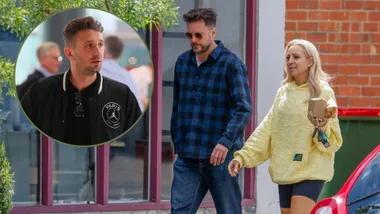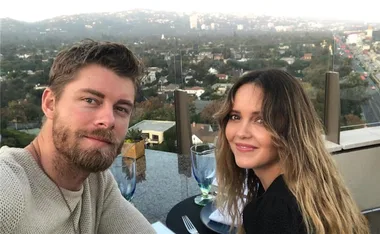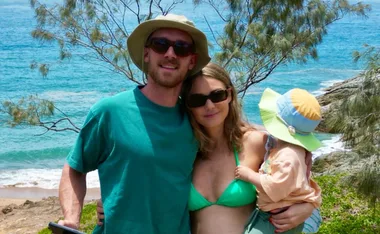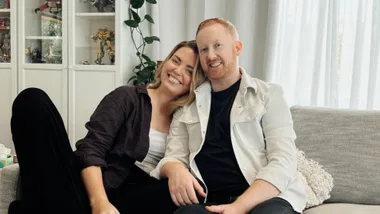There comes a point in the life of even very wealthy people when there is simply nothing left to buy. Billionaire philanthropist Jeanne Pratt, 78, reached that point some time ago. The widow of the late industrialist Richard Pratt, Jeanne has a beautiful home, lovely clothes and a personal staff of 13.
Beyond that, what does a person really need? So she’s giving the rest – or a lot of it – away.
“But please don’t say that I’m giving back,” says Jeanne, over what may have been the prettiest morning tea ever assembled in a private home.
“I don’t like to talk in those terms. It’s simply that, after you’ve bought everything you could ever want, well, philanthropy is fun.”
Some stories are quintessentially Melbourne, and Richard Pratt’s story was absolutely one of them. Born in the Free City of Danzig in 1934, he came to Australia ahead of the Second World War, at the age of just four, after his Jewish mother was hit in the head by a German for simply walking down the street.
Sensing tough times ahead, the family fled and settled in Shepparton, Victoria, where there were a lot of fruit growers. Richard’s father, Leon, predicted – rightly – that fruit growers would need boxes, and so Visy, the cardboard box company, was born.
Richard was a bright boy. He went to a local primary school but ended up at Melbourne’s University High. He played AFL for Shepparton and later for Carlton’s Under 19s, but he was also a keen thespian, touring London’s West End and Broadway with Ray Lawler’s Summer of the Seventeenth Doll.
Then, in the late 1950s, his father became ill, and Richard returned to Melbourne to begin learning the ropes of the company that he would soon inherit.
Richard’s great success – Visy Industries – was obvious to everyone throughout his long and colourful life. Visy is today the largest privately owned packaging company in the world, with more than 10,000 employees; Richard’s worth, at the time of his death, was estimated at $5.4 billion.
Jeanne’s story is less well known, yet it’s every bit as remarkable. She, too, was born in Europe – in her case, in Poland – to Jewish parents who managed to escape before the Nazis got hold of them.
“Just before the war started, my mother had a friend who told her, ‘Things are going to be very bad for Jews’,” Jeanne says.
“Fortunately, she had a brother in Australia who had sent her a visa for a holiday. They were given 24 hours to leave and they left with 200 pounds.”
Jeanne was just three years old when the family disembarked. Her parents spoke no English, and she recalls “being put on the counter at the bank, as the family interpreter. Like most children, I picked up the language quickly – in weeks – and for a while, I was the only one who could speak English.
“I often think about that. I don’t mean to say I dwell on the past – I always live in the present. But my parents’ experience taught me that life is very fragile. We were extremely lucky [to escape the Nazis] and I have a great sympathy toward any refugees. All migrants have the same experience, in a way.”
(On the subject of current migration policy, Jeanne says: “I think if somebody is in genuine danger, they should be let in. If you are an economic migrant, you should wait your turn.”)
Jeanne’s parents settled in Sydney, and she grew up in a little apartment next door to a lending library. By the time she was eight, she had read “every book in the library, including all the bodice-rippers. I remember the day I actually learnt to read, and I remember the thought that came to me: I’m never going to be bored, ever again.”
Like Richard, Jeanne was a bright child who went to the local primary school and then Sydney Girls’ High, before being offered a place at the University of Sydney, where she studied arts and law.
“They made me Freshette of the Year [which is like a beauty queen],” she says. “Please put that in. I’m very proud of it.”
She found the study a bit boring and left university in 1953 to take a job with Sir Frank Packer’s The Daily Telegraph, where “we did five stories a day, and every day ended at the pub”.
Then one day she was visiting Melbourne, where she met Richard, “who was so handsome, he could have been the next Rock Hudson. In fact, they wanted to make him the next Rock Hudson, but he had the business to run.”
They were engaged just three days after meeting and stayed married for more than 50 years, before Richard’s death in 2009.
“I still feel his presence in this house,” Jeanne says. “He is still with me, and still part of our life.”
The house to which Jeanne refers is a most magnificent mansion called Raheen. It was built for a Carlton & United Breweries baron, and was later the home of the Catholic Archbishop of Melbourne, Daniel Mannix, who lived there until shortly before his death at the age of 99. Jeanne purchased the house from the Catholic Church in 1981.
Richard was distraught. He couldn’t see what Jeanne could: her gift to Victoria has been the restoration of Raheen – words alone could not do the carpets, the ceilings, the mouldings, the staircases any justice at all – but also her decision to open the graceful mansion to the public for fundraising events at absolutely no cost to the organisers.
Jeanne personally picks up the tab.
“It’s wonderful fun because it means we’re almost always having a party,” Jeanne says, “and with these events, and The Pratt Foundation [formed by Jeanne and Richard in 1978] we have raised more than 800 million dollars.”
Just hours before The Weekly’s photo shoot, Jeanne had hosted 90 guests at a dinner for former South African president F.W. de Klerk, in what she calls “the old house”, the original mansion, which now stands next to an extraordinary pavilion of glass, designed by architect Glenn Murcutt, where Jeanne lives. Yet not a trace of the party was evident: a small but efficient army of floor polishers and hedge clippers had already been through, returning the house to its usual state – immaculate.
“We are careful not to disturb people too much,” Jeanne says. “There’s a hospice next door, and the extra food gets delivered there, so that’s lovely. Sometimes neighbours have had to put up with lots of cars, but they are really good, and they realise that good things are happening here and they have never complained.”
Jeanne says she decided to turn Raheen into a lively cultural and philanthropic centre because “I don’t like to be bored. It’s as simple as that, really. I like to be busy. There has never been a moment in my life when I haven’t worked. I don’t get paid necessarily, but I always work. I can sit on a beach for about five minutes – I feel as if my brain is turning to scrambled eggs. I don’t like that feeling.
“Currently, I have four jobs: I am the co-chair of Visy, and I’m very proud of the fact that, last year, we recycled half the waste of New York City, and in
the process, we saved 85 million trees.
I’m the vice-president of the Carlton Football Club, plus I’m on the board of the National Gallery in Canberra. Then there is the philanthropy, through The Pratt Foundation, which gives away about $15 million a year. It’s 60 per cent proactive and 40 per cent reactive.
“We have things that we love to do, like The Production Company [a lively theatre company that puts on three Broadway musicals a year, including La Cage aux Folles at the Arts Centre, from November 22.] People say, ‘Oh, she must be passionate about theatre’, but I never was. What actually happens is, I get asked to support something and then I get passionate. So then people say, ‘Well, what is your favourite show?’, and I say, ‘That is like saying, which is your favourite finger, or which is your favourite child?’ I love them all.”
Speaking of children, Richard and Jeanne had three, all of whom still work in the business: daughter Heloise is chair of the Foundation; Fiona is a lawyer who also “walks the factory floors, which is what Richard loved to do”; and Anthony, who now runs Visy from New York, Atlanta and Melbourne. When in town, flame-haired Anthony – “when he was born, he looked like he had a light inside him,” Jeanne says – and his partner and two children (Jeanne has nine grandchildren) stay at Raheen.
In fact, they’d departed the “Glass Pavilion” just a day earlier, and yet there was not a not a single starfish fingerprint on any of the surfaces, not even around the kitchen, where Jeanne sits most days, framed by flowers and exotic fruits piled into stylish towers, with her hair styled into her familiar Pharaoh’s bob, attending to her many business matters, while wearing clothes exquisitely stitched just for her.
“Oh, but there was a mess here,” Jeanne says, smiling. “They had their little hands all over the walls and the windows and the doors!”
She’s not the type to smack their paws or worry about it, saying: “I’m the opposite. I tell them, you can do whatever you want, and you can have anything you want. They’re beautifully behaved. My daughter-in-law gets a little cross with me. She doesn’t want me to spoil them, but that is my job, I think.”
As galling as it may be for the rest of us, there are some wealthy people who have been known to moan about how difficult it is to raise children amid great riches.
Happily, when Jeanne is asked whether she personally found it difficult, she looks amazed: “No!” she says. “It’s difficult to raise children with no money. Why would it be hard to raise children with money? Because they won’t work hard or something? No. My children all work hard; they are all focused. When they were little, I had to tell them, ‘Stop doing your homework, watch some TV’. But then I’ve always said money has never been important. It would be, if I didn’t have any. But I do. And yet I’m not a shopper. I like to play Scrabble on the iPad. I like to have the price of a theatre ticket. Everything else I need, I’ve got.”
Jeanne understands as well as anyone that while money may cushion a blow, it cannot prevent the blow from landing.
“You can’t be smug. You can’t afford to feel self-satisfied, because there is always something out there with a big stick, waiting to hit you on the head,” she says.
Richard suffered through various troubles, especially towards the end of his life. There was cancer to deal with, plus negative media coverage on his personal and business dealings. A light-hearted Jeanne waves away the idea that she was traumatised by the gossip in the press, saying: “I don’t resent media coverage, not at all. I was a journalist! The media have got a job to do. Unfortunately, bad news is good news. I don’t think I liked it, but I didn’t feel anger. I was certainly never furious. I get cross when somebody gives one of our shows a negative review. A critic recently complained that Showboat was racist. Racist! And dated! That’s like saying Shakespeare is racist and dated. They really did not understand the musical, and the history, and they hurt people – the actors – and that kind of criticism can destroy a person’s confidence and career.
“But for the rest of it, well, you move on. I only felt very resentful about Richard being accused of things he didn’t do,” she continues. “As long as I knew Richard, I never knew him to tell a lie. Sometimes he wouldn’t tell you something, but he would never lie. So I always knew that if he said he didn’t do something, he didn’t do it, and yet people feel free to say that he did. But I am not bitter or twisted about anything. Which is not to say that Richard was magnanimous about it. He was not magnanimous at all. It’s bad enough if you’ve done something wrong and you’re worried about getting caught, but if you actually haven’t done anything, the injustice of being wrongly accused gets to you.”
On the subject of her own legacy, Jeanne disputes the idea that she’s constantly giving, saying: “I get as much as I give, probably more. I probably don’t give enough. They say you should give 10 per cent – tithing – but we don’t, and so perhaps I should give more. But I have given away a lot already, and I do it as a representative of two of the biggest groups: women and the aged.”
She’s equally dismissive of reports that Australians are, on the whole, less philanthropic than Americans.
“I find Australians extremely generous,” she says.
“They open their wallets during fire and flood. The poorest person will share. People give of themselves. They volunteer. They roll up their sleeves and do Meals on Wheels. Other countries might give more money, but Australians are willing to give, not only money, but time.”
For her own efforts, Jeanne was named Victorian of the Year in 2013, “and I was very proud of that, because I’ve never been ambitious, and I don’t have any particular skills. I’m amazed to have done anything at all. Once I went back to the village where I was born in Poland, and it was such a small place, a dot on the map. It is extraordinary how life can change. People do say to me, ‘I’m amazed by what you’ve done,’ but I think: I’m amazed by what I’ve been able to do. I never expected any of it.”
This article originally appeared in The Australian Women’s Weekly.

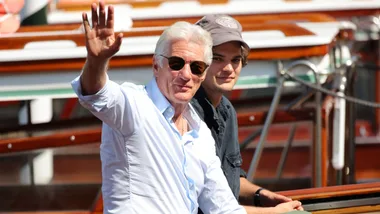
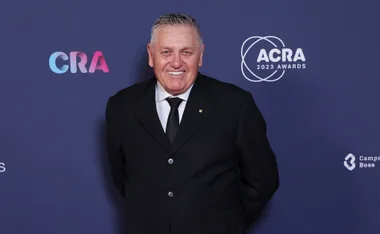

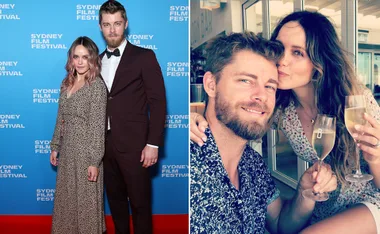
.png?resize=380%2C285)
